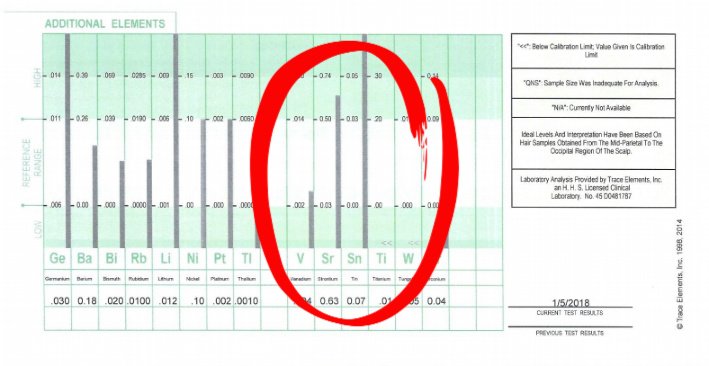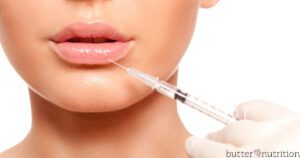 Pink Himalayan salt is a pretty popular trend these days with the health crowd, but from my personal experience, there are good reasons not to use it.
Pink Himalayan salt is a pretty popular trend these days with the health crowd, but from my personal experience, there are good reasons not to use it.
I surely wouldn't be writing this without collecting data from hundreds of clients from all over the world (thank you to all my wonderful clients that participated in my salt study!).
Let me explain.
When doing Hair Tissue Mineral Analysis (HTMA) with my clients, we assess the hair for around 35 different minerals, including - calcium, magnesium, sodium, potassium, copper, zinc, phosphorus, iron, manganese, chromium, selenium, cobalt, germanium, molybdenum, sulfur, uranium, arsenic, beryllium, mercury, cadmium, lead, aluminum, barium, bismuth, rubidium, lithium, nickel, platinum, thallium, vanadium, strontium, tin, titanium, tungsten, and zirconium.
HTMA a very non-invasive and cost-effective way to obtain a tissue sample. Similar to that of a biopsy, except with HTMA we aren't looking for disease like a biopsy would, we are looking for nutrient status.
"Hair is a keratinized tissue consisting of protein. As the hair is being formed it is exposed to the internal metabolic environment including the blood, lymph, and extracellular fluids. Constituents entering the body are then accumulated into the hair and reflect a time-weighted exposure record of nutritional and toxic metal intake." [4]
Something I see frequently with my clients is high-ish tin levels according to their hair tissue mineral analysis report (available internationally).

Sources of Tin
There are several common sources of tin, like: [1]
- Canned Foods
- Herbs
- Fungicides
- Dental Treatments
- Toothpaste
- Cooking Utensils
- Solders
- Dental Fillings
- PVC
- Ceramics
- Stannous Fluoride
- Marine Paints
- Collapsible Metal Containers
- Mining
But one source of tin I see much more than others is pink Himalayan salt. In fact, it's now the number one question I ask my clients when I see elevated tin levels.
While I don't see high tin levels in everyone that uses pink Himalayan salt, that may be due to the amount of salt used, as well the tin content may vary depending on the source, mining, and processing methods used by various pink salt brands.
So What Is Wrong With High Tin?
Tin doesn't have a biological function in the human body, and tin levels should hover close to zero. According to Trace Element Lab, "it has been reported that an excessive level of tin can interfere with iron metabolism and will produce heme breakdown. Elevated tin also increases the excretion of selenium and zinc from the body." [1]
Tin toxicity is also linked with the following symptoms [3, 9]:
- abdominal pain
- vomiting
- nausea
- chronic fatigue syndrome
- skin and eye irritation
- cholangitis of the lower biliary tract
- hepatotoxicity (liver damage)
- neurotoxicity
- psychomotor disturbance
- depression
- headache
Other Concerns with Pink Himalayan Salt (hint: heavy metals)
Aside from my concerns about pink Himalayan salt contributing to higher tin levels, there are other problems with the popular salt.
You see, pink Himalayan salt does contain some important minerals, but it also contains some toxic heavy metals (in bold below), as well as radioactive substances (show with * below), and known poisons (shown with ^^ below). [5]
According to The Meadow Spectral Analysis, the following are the minerals found in pink Himalayan salt:
"actinium, aluminum, antimony, arsenic, astatine, barium, beryllium, bismuth, boron, bromine, cadmium, calcium, carbon, cerium, cesium, chlorine, chromium, cobalt, copper, dysprosium, erbium, europium, fluorine, francium, gadolinium, gallium, germanium, gold, hafnium, holmium, hydrogen, indium, iodine, iridium, iron, lanthanum, lead, lithium, lutetium, magnesium, manganese, mercury, molybdenum, neodymium, neptunium, nickel, niobium, nitrogen, osmium, oxygen, palladium, phosphorus, platinum, plutonium, polonium*, potassium, praseodymium, protactinium, radium*, rhenium, rhodium, rubidium, ruthenium, samarium, scandium, selenium, silicon, silver, sodium, strontium, sulfur, tantalum, tellurium, terbium, thallium^^, thorium, thulium, tin, titanium, uranium*, vanadium, wolfram, yttrium, ytterbium, zinc and zirconium."
According to a 2020 study, heavy metals in pink salt can pose serious concern:
"Few studies have reported the mineral content of pink salts internationally, and found pink salt to contain a variety of essential nutrients including iron, zinc, and calcium, but found some samples also contained impurities or relatively large amounts of non-nutritive minerals such as arsenic, lead, and cadmium. No study has evaluated the nutritional composition of pink salt available for purchase. Non-nutritive minerals such as arsenic, cadmium, lead, or mercury have no established health benefit and in relatively small doses, lead to multiple organ damage." [7]
Speculation about about lead in pink salt is not new. [10]
Other concerns include that iron oxide (a.k.a rust) is what that gives pink Himalayan salt it's rosy color [6, 7], as well as the environmental concerns associated with importing fancy salt that is a finite resource from the mines in Pakistan.
Bottom Line
While pink Himalayan salt may have tiny amounts of minerals that are good for health, it also contains those that are not good for your health as well, outweighing any positive benefit.
Based on this and what I see in HTMA data, I choose to use a plain white Kosher salt without additives (like this or this).
When it comes down to what salt to use, it's a personal decision. Take my clinical opinion and observations with a grain of salt and do what feels best for you.
Ready to Learn About Your Mineral Levels?
Ready to find out your where your body stands when it comes to minerals and toxic heavy metals?
Get started with hair analysis today or learn more here about why you'd want to test your hair for 35 different mineral levels!
Do you think fancy Himalayan salt is worth the hype? Please share in the comments!
PIN IT:
References:
[1] Trace Elements Lab
[2] https://themeadow.com/pages/minerals-in-himalayan-pink-salt-spectral-analysis
[3] https://www.ncbi.nlm.nih.gov/pubmed/3291572
[4] https://pdfs.semanticscholar.org/b504/3481a060ed8b81113b97c3899b493bf4eabd.pdf
[5] https://sciencebasedmedicine.org/pass-the-salt-but-not-that-pink-himalayan-stuff/
[6] https://www.healthline.com/nutrition/different-types-of-salt
[7] https://www.mdpi.com/2304-8158/9/10/1490/pdf
[8] https://acu-cell.com/tin.html
[9] https://www.chelationcommunity.com/2018/06/26/tin-toxicity/
[10] http://www.hormonesmatter.com/himalayan-salt-lead-poisoning-global-scale/







Alfred says
With all due respect for all your research, with all the conflicting articles written about foods these days, you'll find you can't eat ANYTHING anymore. Seriously! Someone will always find something wrong about what was previously considered healthful. My way of life: Don't eat things you definitely know are bad for your body but chill out and allow the universe's Well Being provide. Putting so much attention on finding what's wrong with foods makes it so, more than the possible things that may be wrong.
Henry says
Alfred, seriously. This is why I don’t bite So easily when I see these sorts of warnings anymore. Of course I say this with all respect to the author.
Tomorrow you’ll see an article saying the white on salts is some unknown “hidden chemical” bad for you,. Then a year later we’ll see another study debunking it. It’s many to have negative relationships with food. Not good.
Megan says
From what I hear any salt from the sea now has micro plastics in it, so I feel like you are always going to win some and lose some with salt. 🤷🏻♀️
Angela says
What about Redmond Real Salt? This is the only salt I buy. It comes from ancient sea beds in Redmond, UT. What salt would you recommend?
Catherine says
I haven't noticed the tin issue being as bad in my clients who use that brand.
There are a few salts linked at the end of the article.
Bonez says
Hey Catherine, the first link in the article doesn't work. I'm just curious what brand that was?
Catherine says
Both links are working on my end re: my salt recommendations.
Send me an email — I don't mention brand names on the website directly.
Abundantly,
Catherine
Aaron says
I dont think there's any source of food or water anywhere on earth that doesnt have some trace amount of at least one harmful molecule in it. The benefits of natural high quality salt far outweigh any detriments. One sobering truth remains: youre going to leave this life one day. You could spend every waking moment of every day for the rest of your life studying the human body and its likely you will still never understand every possible intricacy, connection, pathway, nutrient, cell, etc. If you like pink salt, consume it. If you dont or it doesnt like you, dont consume it.
Lin says
So true.
Mitchell says
Well look at it from a marketing perspective, much like the unused parts of corn processing use to make crisco, the salt industry found a way to market the mineral filled layer that they hit before the pure sodium chloride.
Billy Bob Florpkins says
This was the only way for me to leave a comment that I could figure out. To reply to somebody else's. So what I have to say is not in reference to the message of the person I seem to be replying to. I simply came here to say that just because you don't know if tin has a biological function doesn't mean that you know tin does not have a biological function. In fact, it does have a biological function. It is necessary in the process of rebuilding the telomeres. In fact, the lack of tin in the diet May contribute to aging for this reason. Contribute to, not cause, jeez, relax! Stop jumping all over everything I say, Mary! That's a preemptive "No!", OKAY?
Lin says
Ha ha, thanks for the information about telomeres, who would have thought?! If that's true, then it's quite impressive. TBH, just IMHO, I have a belief or suspicion that every mineral serves somehow, it's just all in the matter of amount. Universe and Life is balance and ratios and flow of change...
Judy says
Kosher salt? All salt is kosher. Salt is a mineral, and minerals are kosher. The only difference between table salt and kosher salt is the size of the salt grains. Kosher salt used to be called “Kashering” salt — kashering as in the verb ‘to make kosher’ where coarse cut salt is used in the preparation of meat to make it kosher (it’s the part of the process where the salt ‘draws out’ the blood in the meat). Kashering salt became rebranded as Kosher salt. Unless you add something non kosher to it, it’s just salt.
Katie Manasco says
Curious to know what salt you do recommend. Thanks!
Mary Marston says
My friend knows how to dowse which is like muscle testing, and her reading was that Himalayan pink salt would be detrimental and not to eat it. Thanks for explaining why.
K Smith says
Have you looked into Real Salt from the Great Salt Lake in Utah?
Susanne says
How about Redmond Real Salt? It is also somewhat pink.
Shalley says
I was just about to ask the same thing.
judith says
I also would like to know about Redmond Real Salt.
I bet it's not good.
Missy13 says
What about the microplastics that are found in all sea salt? They’re no better. I believe the tin level findings in your tests are way more related to harmful dental fillings than Himalayan sea salt. Harmful minerals are found naturally in every single natural mineral supplement not just Himalayan salt, because they’re a natural part of the environment. I think the best argument against the high consumption of Himalayan salt is that it’s a finite resource.
Jim Colet says
I found that with using a pendulum salt registers a -7 in benefit/nutrition on a scale of -10 to +10. That was very alarming to me; rat poison registers a -10. Salt is only 3 points away. This applies to regular table salt, sea salt or seasoned salt. So I just stay away from all salt.
I have learned that since salt is a non-organic substance, it is no use to the human body. It has to be organic; ie, it has to become a hydrocarbon, having a hydrogen and a carbon combined to be useful to the body. This is accomplished by plants. Every single mineral is basically a 'rock'. Body cells do not allow 'rocks' to go through their membranes. Non-organic minerals are a mild poison and merely clog up the human body and interfere with healthy bodily processes.
If you want a bio-available source of salt, use such things as dulse.
Maverick says
You cant stay away from salt you need it for stomach acid and your blood is saline.......you will eventually get very sick without salt intake
Minnielove says
Exactly true, you need salt for digestion the key to Nutrition and in fact Tin is vital for healthy hair. Without enough hair falls out...
Caroline Champion says
The body needs sodium magnesium, potassium, boron, calcium, selenium, zinc, copper, iron, phosphorous, chloride and so on. These are minerals and inorganic in many of their forms.
Aaron says
What youre saying completely contradicts what so many others personal positive experiences say. Idk what kind of pendulum you are using or how in the world a pendulum is used to measure the nutrtitional value of anything, but your pendulum is obviously wrong. Table salt is the enemy, not natural salts like high quality pink and sea salts. Avoiding all salt is going to accomplish two things- very boring food and long-term health problems.
Lin says
Could your pendulum be a bit biased?
No, really, I see where you're coming from but inorganic minerals have a use in the kingdom of animalia too. Besides, I wouldn't trust my health with a pendulum even if I believed it had magic powers.
Bouncedancer says
I agree about the pendulum; if I really focus on being very still while I hold it, it'll stop. I believe people will subconsciously make it go in the direction they are hoping for. Same with muscle testing; I test opposite; I've tested strong while holding a piece of Sara Lee cheesecake in my hand, and, trust me, there's not one molecule in there that's good for me. So I won't let that be my deciding factor.
Ria says
Dulse has had issues with being overfarmed for a while. Sometimes it us not available at all.. We need salt, we are electrical beings. I have used Himalayan for years now, and have never tested high for tin. I don't know if there is a perfect salt out there at this point, as the sea salts all contains microplastics.
Alethea says
Interesting, thanks. I dont use much of any salt. If we want flavour in our foods, eat home grown foods, and use herbs to flavour up!
Penny says
I would love it if you tested my Pink Salt as I believe it is the very best you can get.
Quantum Nutrition Labs @ QNLabs.com - Quantum Pink Salt
FB = Quantum Nutrition Labs
Please contact me if you do.
Kaschmer says
It's the source of where the salt comes from. We all need good healthy salt in our diets.
So many so called health foods can actually be unhealthy and even dangerous. Know your source where any of these products are from. Only buy from reputable sellers. If it's to good of a deal it probably isn't.
I use an air dried pink salt from the Himalayas and Hawaii. Heat kills all the good nutrients. Salt & pepper mills grind microscopic metal shavings onto your food. Unfortunately most salt is toxic. Sodium added to processed foods has the highest toxicity which is why we have so many health issues.
Xisca says
I had already decided not to use it because my hair iron increased 10fold over the norm!
I have not even eaten a kilo so it comes from something else, and related blood test were normal...
But of course I removed all sources including liver. I have to keep the red meat though. ..
Allyson Turner says
Wow. Thanks for this article. Believe it or not, the pink color is often achieved by adding red food dye. The (nefarious) companies don't have to list it because it is less than 3% of the overall content.
Nancy says
I got a kidney stone only one time. I wondered what it was made of, and when I broke it up, it looked just like Pink Himalayan Salt. I think it was! THAT hurt and I won't eat that kind of salt anymore!
Caroline Champion says
Kidney stones are not soluble so can't be salt. They are formed from oxalates.
Lynne Clark says
Wondering why you choose Kosher salt vs a salt with iodine included? I remember my mother getting treated for 2 goiters, she didn't use salt at all.
Susan Sciotto-Brown says
Thanks for this info. My Tin levels came back as very high and I couldn't figure out why. It may well be the Himalayan sea salt I've been using. Too bad, since it tastes good!
Ali says
Himalayan salt and sea salt are two different things. As far as I know there is no such thing as "himalayan see salt"
Billy Bob Florpkins says
This was the only way for me to leave a comment that I could figure out. To reply to somebody else's. So what I have to say is not in reference to the message of the person I seem to be replying to. I simply came here to say that just because you don't know if tin has a biological function doesn't mean that you know tin does not have a biological function. In fact, it does have a biological function. It is necessary in the process of rebuilding the telomeres. In fact, the lack of tin in the diet May contribute to aging for this reason. Contribute to, not cause, jeez, relax! Stop jumping all over everything I say, Mary! That's a preemptive "No!", OKAY?...
Did you guys check out Catherine, the hottie that wrote this article? Smokin'! C'est magnifique! I want one.
Anna says
I've always wanted to like it and try it and we have even owned some, but when it has come down to it, I pull back and put it away in a dark far-off cupboard somewhere away from food every time due to the radioactive elements in it. Somehow I never think it is a good idea intuitively in that final moment. So I threw it away and we don't buy it anymore. Even the heavy metals alone wouldn't be good, so maybe it's a good thing that I never used it. I also wonder if I'm just being paranoid, but so far it hasn't been worth the risk to me, even just the psychological aspect of wondering what effect it could have.
Dawn Smith says
Here is my reasoning for agreeing with the author concerning the best option for salt purchase. I have been struggling with hormones and thyroid health as long as I can remember. I am currently in a power play with 2 different doctors on whether to take out my very sick thyroid. While they argue I got busy researching and ended up making simple changes to my life and am already feeling like my younger self again and I am 59 now. Doctors just wanted to shove hormones and prescriptions down my throat instead of getting to the root of things. It would take to long to list some of the changes i made so do your own research but the salt thing is real for people with thyroid issues and hormone issues.
Angela H says
Dawn, that’s great you were able to heal with food! Best approach for sure. Since this article is specifically about healthy salts, what did you find that works best for hormonal health? Thanks
Angie says
Thank you for the research on Himalayan Salt - I reviewed almost all of your research:
References:
[1] Trace Elements Lab
[2] https://themeadow.com/pages/minerals-in-himalayan-pink-salt-spectral-analysis
[3] https://www.ncbi.nlm.nih.gov/pubmed/3291572
[4] https://pdfs.semanticscholar.org/b504/3481a060ed8b81113b97c3899b493bf4eabd.pdf
[5] https://sciencebasedmedicine.org/pass-the-salt-but-not-that-pink-himalayan-stuff/
[6] https://www.healthline.com/nutrition/different-types-of-salt
[7] https://www.mdpi.com/2304-8158/9/10/1490/pdf
[8] https://acu-cell.com/tin.html
[9] https://www.chelationcommunity.com/2018/06/26/tin-toxicity/
[10] http://www.hormonesmatter.com/himalayan-salt-lead-poisoning-global-scale/
and your [7] research showed that this particular study was done on Australian Salt - I did ask other companies that sell salt and they did confirm that depending on what part of the world salt is being mined/gathered will determine the natural and unnatural occurring metals in salt. for that matter, any other herb/seasoning/food/animal/air that we breathe will have levels of metals and a lot more. Every living thing has different traces of something based on its exposure. This was very educational. My journey to a better me is ongoing. As it has been said - I take this with a grain of salt. I will continue my research and appreciate yours. Thanks! Angie in Alabama
Catherine says
Hi Angie —
Thanks for joining the conversation!
Abundantly,
Catherine
Charles Newton says
Angie ... SO... Did you find a Himalayan salt that would be beneficial best case scenario. Some look more for the magnesium, potassium benefits and rest are a plus because of medical benefits for excess water retention and other minerals are just a plus. Mfg. of unnatural nature adding things that shouldn't be there and they don't report it like red dye to disguise it as Himalayan salt.
Teal Van Vlymen says
Wow what a rough crowd in the comment section. I get the feeling if this article was about lead in paint, many of the commenters here would be saying," how dare you tell us to stop eating lead paint, its so sweet! You are just afraid of food, if we cant eat lead paint then there must not be anything else to eat." Snowflakes dont like knowledge or science, it confuses them.
Its like they dont understand that a nutritionist' job is to nutrition. That means find the best information about the best foods and present that info. I think the article was great. As a Peatarian we tend to avoid the pink salts due to iron content, but Tin is a new level for me. Cadmium in my cooking salt? Gimme me more! lol.... this clown world.
Sea salt, I love it. Tastes great, and if I want to I can go collect it myself. But lets be honest, the crystallization process tends to purify minerals wiling to crystalize, so couldnt you avoid many of the micro plastics as well as the heavy metals by just dumping your bags of salt into a couple glasses of warm water until dissolved, then hang a string between them. As a dishwasher in a artisan whisky bar, the chefs did this making rootbeer flavored salt as well as garlic if I recall correctly, and I found the differential crystal formation fascinating, and of course, the salts were delish. It makes sense that any salt mixed with water would purify itself somewhat with each extraction and crystallization. You could do it many times over and just get a purer product each time, like distillation of grain alcohol(everclear-gemclear).
I dont use the pink salts, but it seems every avocado toast yoga teacher on Earth thinks its the bees knees.... so thanks for spitting truth... from a scientific perspective....
A Deleon says
I've been using Himalayan salt since before it was a trend, with no adverse effects. Are you saying you prefer to ingest microplastics in sea salt?
Bruce Frank says
So, this generalized report is ripe for the need of specificity. Which brands contain toxic heavy metals? Sea salt is now contaminated with micro-plastics and other toxins from dumping and leaking of chemicals into the sea. Do you have an alternative?
Bernadette D Telfare says
Would that include organic pink salt?
Catherine Crow, NTP says
Yes, any pink salt.
Gina says
Only the first link works for recommended salts. My question is why no iodine in the salt? Do you recommend staying away from that?